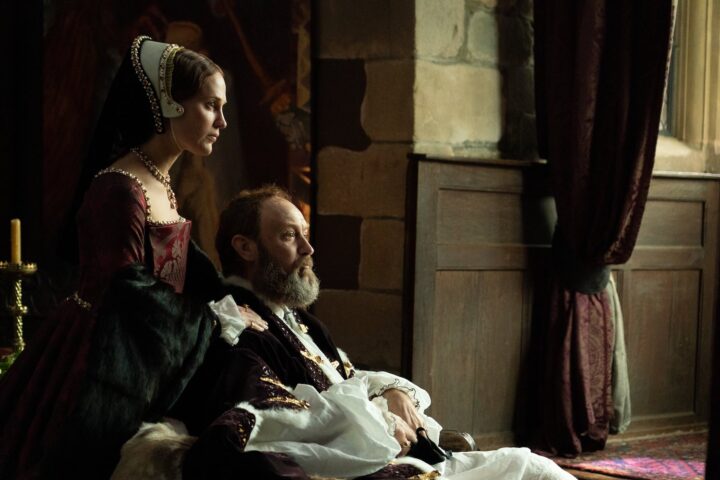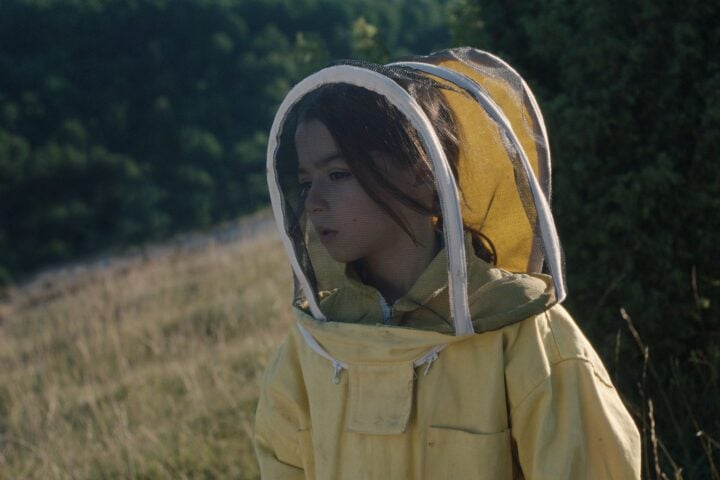Stephen Fry, normally the embodiment of droll detachment, cuts a much earthier figure in Treasure, the new film from German writer-director Julia von Heinz. With a thick beard and scraggly gray hair, a credible Slavic accent, and a distinctly oafish slump in his large frame, Fry transforms himself into Edek Rothwax, a haunted Holocaust survivor and recent widower who, in accompanying his daughter Ruth (Lena Dunham) to his homeland of Poland in 1991, would rather flirt with translators and sing karaoke than revisit the locales of his past.
Heinz shoots Poland through a gauzy gray filter that’s almost as extreme as the hackneyed orange tint used to portray Mexico in so many thrillers that center around drug trafficking. The dreary look is certainly appropriate, though, to the depressing landscapes of ramshackle buildings, not to mention the immediately post-communist time period and lingering trauma of the Holocaust half a century earlier. It also matches the tone of the film, which, despite some gentle attempts at wild-and-crazy-dad antics, remains resolutely dour throughout.
Much of the conflict, at first, is mined from Edek’s attempts to derail Ruth’s plans. The man has only joined her on the trip as a protective measure but ironically proves to be an obstacle to Ruth’s entire purpose: to learn more about her parents by exploring their past. First, and for reasons that are obvious to the viewer but not to Ruth, he refuses to travel by train—something that has, rather implausibly, never before come up despite them both living in New York City. Next, after making fast friends with a taxi driver named Stefan (Zbiegniew Zamachowski), Edek sidetracks Ruth’s trip to Lodz with visits to unrelated historical sites.
Eventually, a defeated Edek, unable to contend with Ruth’s single-minded sense of purpose, decides to get with the program. A divorced journalist with an eating disorder, Ruth is trying to find some kind of connection with her family history in the wake of her mother’s death. When visiting the apartment building where her father grew up, they find it occupied by the same family that moved in after his family had been kicked out in 1940. Not only that, they still have some of his family’s old possessions—their couch, a silver bowl, a porcelain tea set, and Edek’s father’s winter coat, inscribed with his initials. Valuing these family heirlooms more than money, she buys them all for more than they’re inherently worth.
The entire film could have been built around a territorial dispute between the two families—competing claims of ownership, demands for reparations—but Treasure is structured more like a road movie, with this being one of several distinct episodes, albeit one that’s revisited at the end for a grand thematic climax. We’re informed at the beginning that what unfolds is “inspired by a true story” but only by proxy: Von Heinz’s screenplay is based on the novel Too Many Men by Lily Brett, who fictionalized her own “daughter-father trip,” as Edek calls it at one point.
Unlike von Heinz’s own cinematic memoir, the 2020 suspenseful political thriller And Tomorrow the Entire World, this story gently flows as a series of anecdotes rather than plot points, our focus squarely on the frustrated dynamic between a troubled woman and her warm and well-meaning but emotionally closed-off, nagging father. Dunham does creditable work here, infusing the neurotic, self-centered character she’s known for playing with a more compassionate center. Ruth, with her bizarre diet and single-minded obsessiveness—she packs her suitcase full of books about Nazis—is also a more pitiable character than we’re used to seeing from Dunham. But Fry, finding soulful depths in Edek Rothwax and revealing them only in glimpses, is the main attraction here, enlivening the film with his presence.
Following a visit to Auschwitz, where Edek provides a guided tour of his arrival and detainment, he and Ruth are able to connect in a new way, the emotions simmering under the surface now coming out and into the open. This is where Treasure proves most conventional and least compelling—in its promise of a lasting renewal of the father-daughter bond, a deepened mutual understanding and acceptance. Because the casually observational moments of von Heinz’s film are so rich—as in Edek’s ease with bribing hotel clerks, and a scene centered around the rationing of toilet paper—its thematic contrivance becomes harder to accept.
Since 2001, we've brought you uncompromising, candid takes on the world of film, music, television, video games, theater, and more. Independently owned and operated publications like Slant have been hit hard in recent years, but we’re committed to keeping our content free and accessible—meaning no paywalls or fees.
If you like what we do, please consider subscribing to our Patreon or making a donation.



